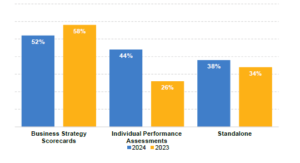 Jamie McGough
Jamie McGough
Among S&P 500 companies, the prevalence and practices of ESG metrics in executive incentive plans have largely stabilized with few material changes in 2024 vs. 2023. While ESG metrics are highly common, weighting on these metrics remains low – typically 5%-15%.
Overall Prevalence
In 2024, nearly three-quarters of the S&P 500 linked a portion of incentive compensation to the achievement of ESG metrics – unchanged from 2023. Although there is variation by industry, a majority of companies in all sectors use one or more ESG metrics in their executive incentive arrangements.
Short-Term Incentives Remain Principal Focus
A large majority (73%) of companies using ESG metrics do so in their short-term incentive (STI) plans, unchanged from 2023. Usage of ESG metrics continues to be majority practice in all underlying industry sectors – ranging from 50% to 95% across the 11 industry sectors comprising the S&P 500.
Alternatively, ESG in long-term incentives (LTI) remains a distinct minority practice with only 11% (9% in 2023) of the S&P 500 doing so. Only in the Utility sector is the use of ESG in LTI majority practice, (57% and unchanged from 2023). Among Utilities the focus is on Environmental metrics. Prevalence in other industries ranged from 0% (Communication Services) to 15% (Materials).
How ESG Metrics are Used
Unlike traditional financial and operational metrics, most ESG metrics are not individually measured and weighted. Instead, most companies use either scorecards and/or individual performance assessments.

Both approaches generally incorporate a list of undifferentiated performance measures that include an ESG metric with a variety of other operational or strategic criteria. These two dominant approaches reflect that many companies are either unable, or find it undesirable, to set the more precise goals for these metrics and prefer instead to use judgment and discretion to assess results. This seems to be especially so with DEI related metrics.
Social Metrics Predominate
Social metrics are the most prevalent ESG metric used in incentive plans. In 2024, 68% (up slightly from 66%) of the S&P 500 used Social metrics, while 39% used Environmental and 30% Governance metrics respectively. An additional 26% included metrics that crossed multiple areas, often to address ESG strategy or measure ESG scoring goals. Prevalence for each of these are up slightly from 2023.
Among the top-10 used ESG metrics, seven are Social, two Environmental and one Governance – unchanged from 2023. The term “Social” is a bit of a misnomer, a more precise term would be “employee-related” metrics since very few have an external orientation. Among the seven Social metrics, six pertain to internal employee-related criteria. Usage of Social metrics varies across industry groups but is majority practice among all 11 sectors.

Environmental Metrics
Carbon Footprint and Emission Reduction is the most common Environmental metric, included in 28% of all S&P 500 companies (up from 23% in 2023). No other Environmental metric exceeded 12% in prevalence.
Overall, Environmental metrics had the most change from 2023. In 2024 three sectors Energy, Utilities and Materials have ≥50% prevalence while 2023 had only two. In addition, there are now five sectors with ≥40% prevalence of Environmental metrics vs. three in 2023.
On the Horizon
Lastly, while we have not seen material changes in reported practices we noted trends in our consulting that is likely to emerge in subsequent year’s reporting for DEI-related metrics, specifically:
― Less quantitative;
― More subjective;
― Combining with other criteria; and/or
― Some change in terminology (e.g., talent development).
These changes we believe are reflective of recent Supreme Court decisions, that while not immediately applicable to for-profit commercial organizations, nevertheless have been undertaken as adjustments to minimize any similar longer-term risks.
Our study [ESG Incentive Practices at S&P 500 Companies – Meridian Compensation Partners (meridiancp.com)] provides further details of prevalence, metrics and industry practices.

